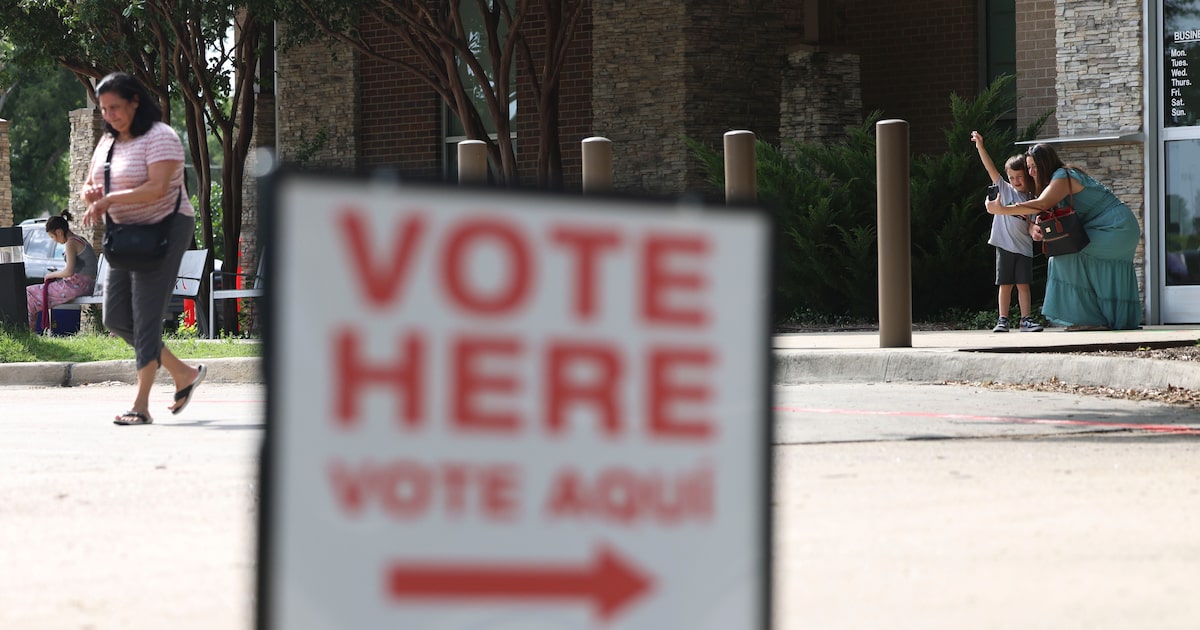AUSTIN — Critics say it will change nothing. Supporters argue that it’s necessary to underline what’s already in law.
Either way, Texas voters will have the opportunity to vote this fall on a proposed amendment to the state constitution, known as Proposition 16, that would ban all noncitizens from participating in elections. Election Day is Tuesday, Nov. 4; early voting opens Monday, Oct. 20.
Voters will decide this fall on 17 amendments to the state constitution. It’s important to understand how the amendments will impact day-to-day life in Texas before votes are cast. Election Day is Tuesday, Nov. 4, early voting opens Monday, Oct. 20.
Texas law already prohibits noncitizens from participating in elections. The state’s election code says only U.S. citizens may vote or register to vote in Texas. And the state constitution also outlines that voters must be citizens and residents of Texas.
But since President Donald Trump alleged large-scale voter fraud in his 2016 election win, many Texas Republicans have grown more concerned about noncitizens participating in elections, despite it being a rare occurrence.
Breaking News
“Republicans have tried to make hay about vote fraud for a better part of the last decade, and this is one of those moments that is typical of that approach,” said Brandon Rottinghaus, a political science professor at the University of Houston. “Republicans want to inflame the idea that vote fraud is rampant in Texas. Obviously, that’s not true.”
The proposed amendment to the Texas Constitution would add “persons who are not citizens of the United States” to a list of those ineligible to vote in Texas. The new language would be placed in the constitution’s “Bill of Rights,” a symbolic piece of real estate in a 273-page document that had been amended 530 times since it was ratified in 1876.
Paul Jacob, chair of the advocacy group Americans for Citizen Voting, said despite any perceptions of redundancy, Texas voters should approve Proposition 16 because it provides clarity for courts.
“If the people of Texas want noncitizens to vote, that’s their right,” Jacob said. “If they don’t, that’s their right. But if it’s unclear, then what the citizens want might not be what ends up being policy. So we think it’s critical to be clear.”
Jacobs cited a 2023 court ruling in California that cleared the path for noncitizens to vote in certain elections. While the state’s constitution says citizens can vote, it does not explicitly say noncitizens cannot vote.
Eligibility to vote has been extended to noncitizens in at least 20 cities. None of them are in Texas.
Emily Eby French, policy director of the voting rights group Common Cause Texas, said she opposes the amendment because its purpose is to “gin up controversy.”
“They’re trying to have people go to the ballot boxes and read this and go, ‘Wait, can noncitizens vote in Texas?’ and then have that uproar going into the next legislative session,” Eby French said.
The amendment is part of a strategy to garner support for proof-of-citizenship requirements for voter registration, she said. A bill requiring proof of citizenship to register to vote failed earlier this year at the Texas Legislature after lawmakers ran out of time to pass the proposal.
That proposed legislation, Senate Bill 16, would have required Texans to provide forms of identification that are far less common and accessible to many, including a passport or a birth certificate. Opponents also raised concerns about what it would mean for women who changed their surnames after getting married.
“I’m worried that if this amendment passes, which I think it probably will, that [lawmakers] will say, ‘Well, now we need to prove it. Now we need to, you know, lock it down,’” she said.
Jacob, the chair of the advocacy group supporting Proposition 16, said that in recent elections, voters have widely approved citizenship requirements to vote, including those held in blue and swing states. For instance, about 70% of Wisconsin voters approved a citizenship requirement in 2024.
“Across all demographic groups, people have a fairly fundamental sense that if you’re you’re going to be voting, you need to be a citizen,” Jacob said.
Nineteen states have approved citizenship requirements for voter eligibility.
Proposition 16 is among 17 amendments to the Texas Constitution on the ballot this year. The University of Houston’s Rottinghaus said that while redundant amendments have been placed on the ballot in the past, such as bans on income taxes, the citizenship requirement is somewhat different.
“We’re seeing a lot more messaging amendments than we have in the past,” he said. “A lot of these amendments are redundant by law, but are politically potent. I think this kind of falls into that category.”

